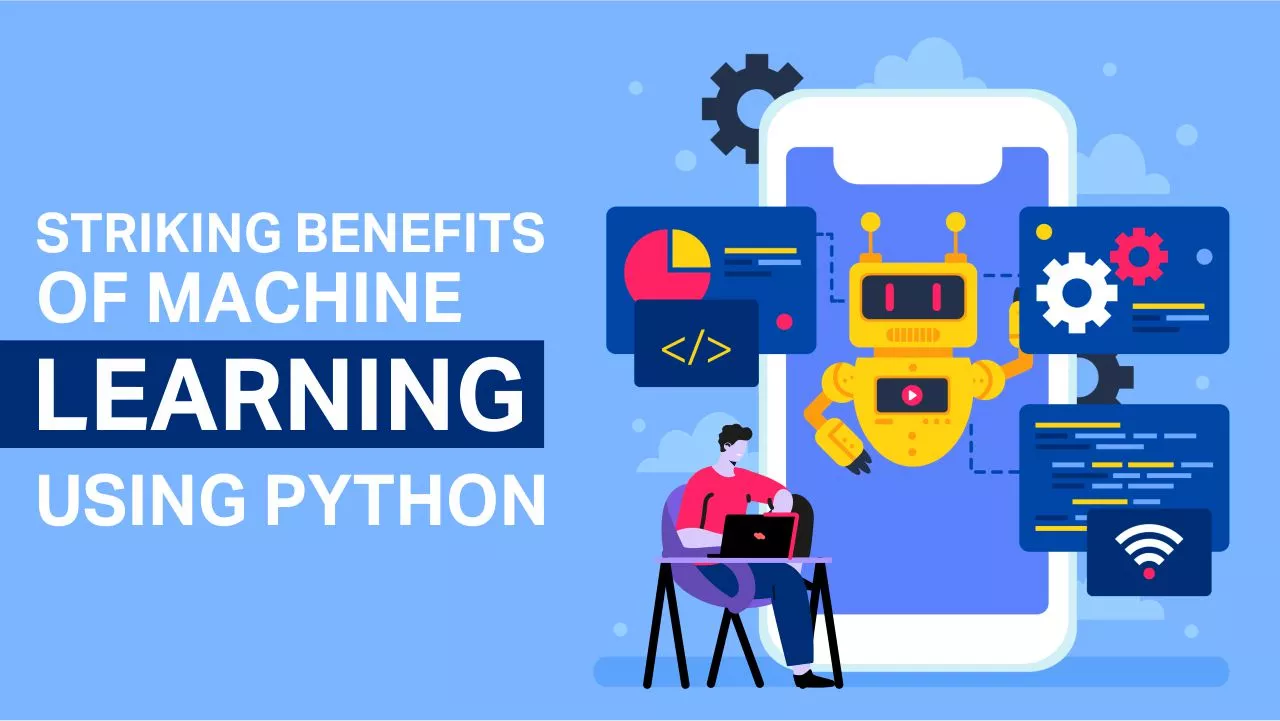
Striking Benefits of Machine Learning Using Python
What is Python used for: Python is a widely adopted programming language, which applications are frequently used in the construction of websites and software, streamlining tasks through automation, and performing data analysis. Python is widely regarded as one of the most useful programming languages, especially for machine learning using Python. It offers a rich ecosystem of libraries, frameworks, and tools that make it highly suitable for developing and deploying machine learning models.
What is Python used for in Machine Learning
Here are the 5 major benefits of machine learning using Python:
1. Easy To Learn And Read
Python is usable by both inexperienced and seasoned programmers due to its clear and legible syntax. Due to its simplicity, developers may concentrate more on the machine learning algorithms’ logic and less on writing complicated code.
2. Extensive Libraries
Python has a wealth of potent libraries made especially for machine learning tasks. Scikit-learn, which offers a complete set of tools for data preprocessing, feature selection, model training, and evaluation, is the most well-liked option. Additionally, libraries like NumPy and Pandas provide effective tools for manipulating data and performing numerical computations.
3. Deep Learning Frameworks
Machine learning Python is the language of choice for many deep learning frameworks such as TensorFlow, PyTorch, and Keras. These frameworks provide high-level abstractions and tools to build and train complex deep learning models, including convolutional neural networks (CNNs), recurrent neural networks (RNNs), and transformer models.
4. Large Community Support
A sizable and vibrant community of data scientists, researchers, and developers use Python. Through forums and online communities, this community shares information develops machine learning libraries, and offers thorough tutorials and documentation. It is simpler to find solutions to issues and stay current with the most recent developments in the sector thanks to this strong support network.
5. Integration Capabilities
In machine learning python’s versatility extends beyond machine learning. It can seamlessly integrate with other technologies, such as web frameworks (e.g., Django, Flask) for building machine learning-powered applications, or with big data processing frameworks (e.g., Apache Spark) for handling large-scale datasets.
Machine Learning Courses to Master Python Skills
B.Tech CSE (AI & ML) with the academic support of Samatrix & IBM is a 4 years undergraduate programme that imparts a deep knowledge of what to use Python for and its uses in problem-solving, Data Analysis, Probabilistic Modelling and Reasoning and Deep Learning.
Moreover, B.Tech CSE (AI & ML) programme focuses on teaching students the principles and applications of Artificial Intelligence and Machine Learning. Simultaneously, developing expertise in developing intelligent systems and analyzing data, opening up diverse career opportunities in technology-driven industries.
Advantages of Collaboration with Samatrix and International Business Machines Corporation
- Training under the supervision of IBM Experts.
- Working at IBM Big Data Analytics Lab for real-world exposure to industry-relevant case studies.
- Chances to earn Globally Valid Digital Certifications offered by IBM.
- The curriculum made with Samatrix experts covers all important concepts of supervised learning (parametric/ non-parametric algorithms, support vector machines, kernels, neural networks), unsupervised learning (clustering, dimensionality reduction, recommender systems, deep learning), and Hadoop.
- Training according to Industry relevant projects on ML regression, tree algorithm, support vector machines, and deep learning.
FAQs
What is machine learning in Python?
In Machine learning, Python is used for the implementation of algorithms and models that allow computer systems to automatically learn and improve from data without explicit programming. Python provides a rich ecosystem of libraries and frameworks such as scikit-learn and TensorFlow, making it a popular language for machine learning tasks.
Which language for machine learning is the best?
There isn’t a definitive “best” language for machine learning, as it depends on various factors such as the specific task, ecosystem support, and personal preference. However, machine learning using Python is widely regarded as one of the most popular and versatile due to its extensive libraries, ease of use, and strong community support.
Where is Python used in Machine?
Python is used in various stages of the machine learning workflow. It is employed for data preprocessing, feature engineering, model development, and evaluation. Python’s libraries like NumPy, Pandas, and scikit-learn provide powerful tools for data manipulation, while frameworks such as TensorFlow and PyTorch enable building and training complex machine learning models.
Recent Post
